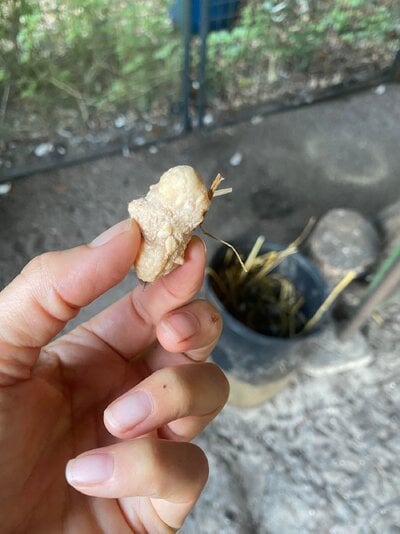DHutchins
Songster
Posting in hopes of helping someone else with the same issue.
Last Wednesday I found a lash egg in the coop laid by my little silkie, Tina. After researching online I feared it was a death sentence and frantically tried to get her into our avian vet with no luck.
She laid a second a few days later. I considered going to Tractor Supply and getting some LA 200 (broad spectrum antibiotic) until I came across this helpful article that stated that there are two types of Salpingitis - viral and bacterial.
The bacterial is "malodorous" aka. smells bad, and there was nothing about the odor of the viral. This lash egg had no odor.
After reading through Dr. Annika's description I realized she most likely has the viral version so an antibiotic won't help. There is no treatment though I did three things.
1) a 10 minute Epsom salt bath
2) 1/2 cup oregano tea in the water for everyone for a week
3) some chopped raw garlic in some rolled oats soaked with water
It is not 7 days later and she has no other symptoms. She's running around with all the other chickens, eating and drinking normally and appears to be totally fine. My understanding is that she may never lay again and that many people slaughter their chickens when they discover a lash egg. This is very disappointing as chickens have many other great qualities. I use the chicken poop for my permaculture garden, they help me keep the insect population at bay and also help spread mulch when needed.
I'll try to keep you updated and I hope this helps someone else have hope!





Last Wednesday I found a lash egg in the coop laid by my little silkie, Tina. After researching online I feared it was a death sentence and frantically tried to get her into our avian vet with no luck.
She laid a second a few days later. I considered going to Tractor Supply and getting some LA 200 (broad spectrum antibiotic) until I came across this helpful article that stated that there are two types of Salpingitis - viral and bacterial.
The bacterial is "malodorous" aka. smells bad, and there was nothing about the odor of the viral. This lash egg had no odor.
After reading through Dr. Annika's description I realized she most likely has the viral version so an antibiotic won't help. There is no treatment though I did three things.
1) a 10 minute Epsom salt bath
2) 1/2 cup oregano tea in the water for everyone for a week
3) some chopped raw garlic in some rolled oats soaked with water
It is not 7 days later and she has no other symptoms. She's running around with all the other chickens, eating and drinking normally and appears to be totally fine. My understanding is that she may never lay again and that many people slaughter their chickens when they discover a lash egg. This is very disappointing as chickens have many other great qualities. I use the chicken poop for my permaculture garden, they help me keep the insect population at bay and also help spread mulch when needed.
I'll try to keep you updated and I hope this helps someone else have hope!
Attachments
Last edited:



